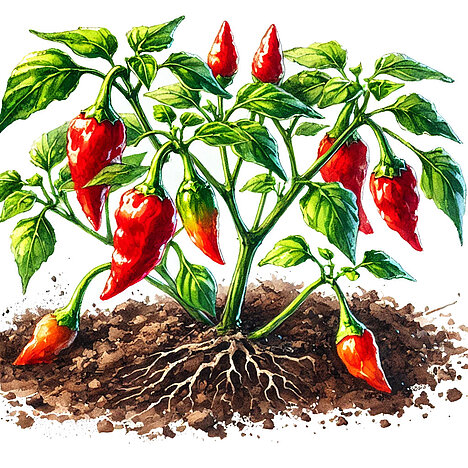Scotch Bonnet Chilies

When it comes to feeding our dogs, safety and health are paramount. Many dog owners are constantly on the lookout for new and interesting foods to offer their furry friends, but not all are safe or suitable. Scotch Bonnet chilies, known for their intense heat and distinctive flavor, are a popular spice in Caribbean cuisine. But how do these fiery peppers behave when it comes to our dogs? This article dives deep into the world of Scotch Bonnet chilies to assess their suitability as part of a dog's diet.
What are Scotch Bonnet chilies?
Scotch bonnet chillies belong to the Capsicum chinense species and are closely related to other hot chillies such as habaneros. They are particularly well-known in Caribbean cuisine and are characterized by their strong heat and fruity aroma. These chilies can come in a variety of colors, including red, yellow, green and orange. The name "Scotch Bonnet" refers to their distinctive shape, which resembles a Scottish tam o' shanter hat.
Potential benefits and risks
Benefits: Rich in nutrients, but to be consumed with caution
Scotch Bonnet chilies are rich in vitamins A and C, which support the immune system, as well as capsaicin, the active ingredient responsible for the spiciness and may have various health benefits. For humans, moderate amounts of capsaicin can promote heart health and act as an antioxidant.
Disadvantages: A high risk for dogs
Digestive problems
The pungency of Scotch Bonnet chilies can cause severe digestive problems in dogs, including vomiting, diarrhea and stomach pain. Dogs do not have the same tolerance to spicy foods as humans.
Mouth and eye irritation
The capsaicin in Scotch Bonnet chilies can cause mouth irritation in dogs, resulting in excessive salivation, restlessness and possibly pain. If a dog accidentally touches its face after coming into contact with chilies, this can cause eye irritation.
Toxicity
While capsaicin is not toxic to dogs in the strictest sense, the symptoms caused by ingesting large amounts can be dangerous and in rare cases can lead to dehydration or shock.
Not recommended for dogs
Despite the potential health benefits that Scotch Bonnet chilies may offer to humans, the risks far outweigh the benefits when it comes to feeding them to dogs. The intense heat of these chilies is not suitable for a dog's digestive system and can lead to a range of unpleasant and potentially dangerous symptoms. As a responsible dog owner, it's important to put your dog's safety and well-being first and avoid foods that could harm them. There are many safe and nutritious alternatives that you can offer your dog without the risk associated with feeding Scotch Bonnet chilies.
If you notice any signs of hypersensitivity or poisoning in your dog, you should see your vet immediately. We are not a substitute for a vet, but we try to be as accurate as possible. Every dog reacts differently and we recommend you get a second opinion or consult your vet if in doubt.
Stay healthy and take good care of your four-legged friend!😊